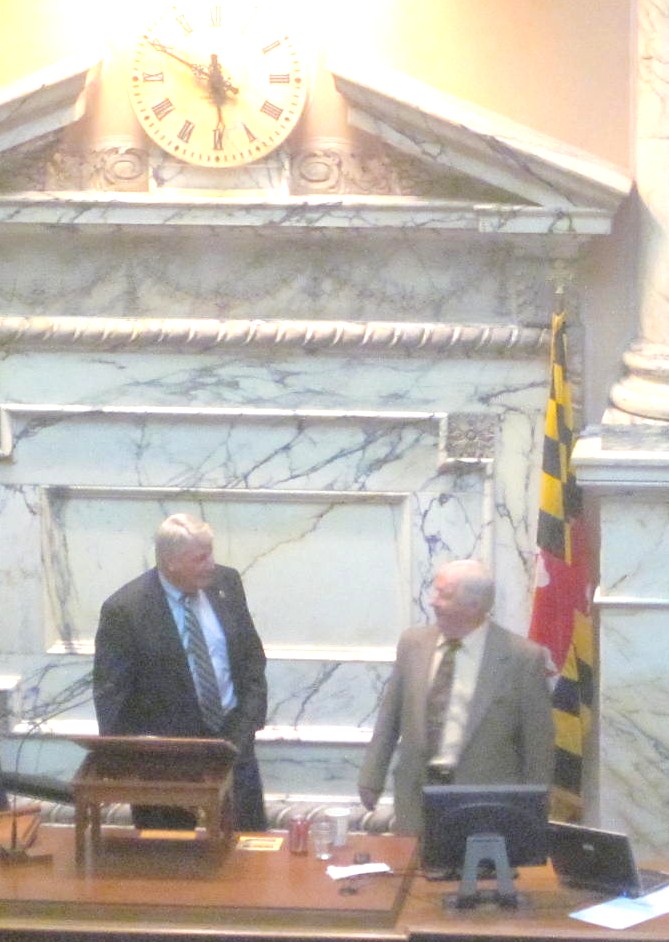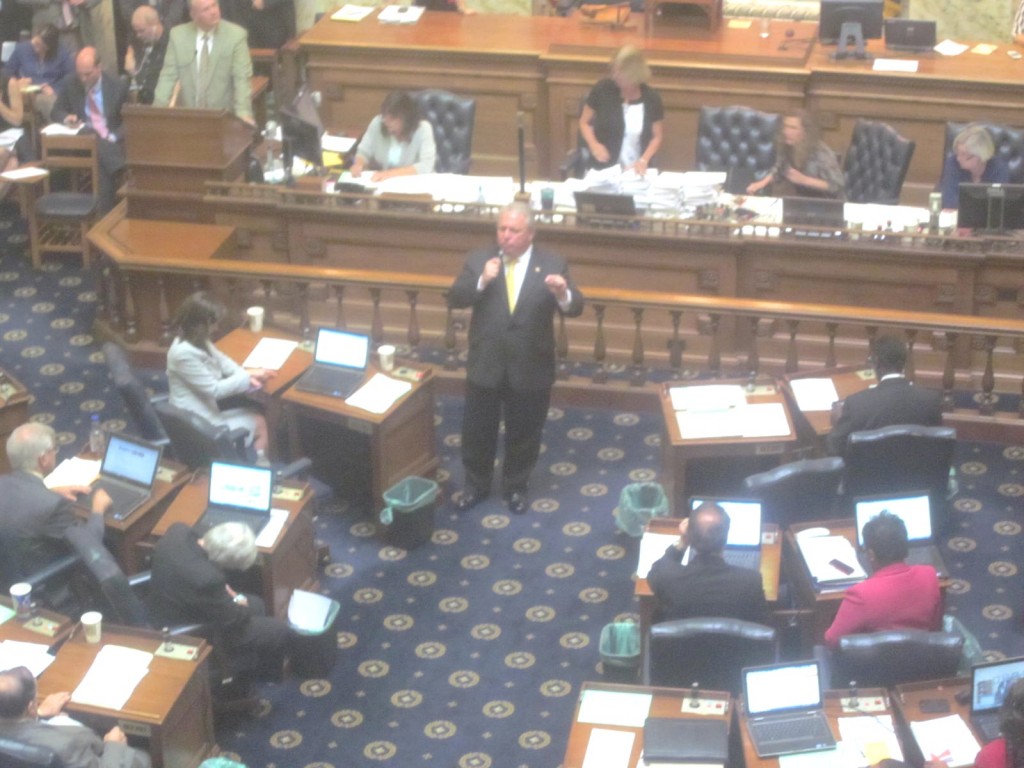Slots for veterans enlisted to help gaming bill pass

House Speaker Michael Busch, left, and Del. Sonny Minnick after Minnick offered slots for veterans amendment.
By Len Lazarick
For years, veterans posts have come to Annapolis trying to get slot machines and the money they bring in to help them survive.
The vets on the Eastern Shore have had slots at their posts for some time, but year after year, the House Ways & Means Committee has refused the same privilege to veterans groups in the rest of Maryland. On Monday, a delegate tried to amend slots for vets into the mammoth bill to expand casino gambling.
No dice, said the House gaming subcommittee, refusing to put the amendment into the bill. But suddenly, Tuesday afternoon, the House veterans caucus was told that slots for vets everywhere in Maryland was going to be an ornament on the Christmas tree that the gaming bill had become.
Del. Sonny Minnick, a Navy veteran from Dundalk who chairs the Veterans Caucus, offered the amendment. Low and behold, Del. Frank Turner, the gaming subcommittee chair who has repeatedly rejected slots for vets, reversed himself and accepted it as a friendly amendment. In the past, Turner has argued that he wanted to see all the slots casinos open for business before scores of veterans organizations and other nonprofits got theirs.
Attempt to buy votes
To many delegates, it was a transparent attempt to buy votes for a sixth casino in Prince George’s County. “I believe it is out here to buy votes at the end of the day,” said Del. Joe Boteler, a gaming subcommittee member and a National Guard veteran. “They deserve better than this.”
But Minnick insisted, “This might be our only shot for getting anything for veterans.” The machines for veterans would not be full-fledged video lottery terminals, but the proposed ticket dispensers work like slot machines. Ninety percent of the money would be awarded to the gamblers, and the posts would keep 5.5% and send the other 4.5% to the state.
“I think there are a lot of people who are going to vote for this amendment who are not going to vote for the underlying bill,” Minnick said.
Fellow Navy veteran Tony O’Donnell, the House minority leader, said, “I find it offensive that veterans would be used.” (O’Donnell earlier called Minnick his “shipmate,” and Minnick, 79, joked, “Are we going to hug and kiss?”)
Del. Michael Smigiel, R-Cecil, an ex-Marine, also objected, “We’re about to trade the honor of our veterans for treasure.”
Taking what they can get
But other veterans, such as Del. Mike McDermott, R-Worcester, supported the amendment, as well as the entire bill, and Del. Kathy Afzali, R-Frederick, who had introduced the subcommittee amendment, said, “I will take what I can get.”
But Del. Doyle Niemann, a Prince George’s County assistant state’s attorney who had prosecuted people for operating illegal slot machines, said, “This is the most dangerous amendment we’re talking about,” and putting the machines in veterans posts “will explode slot machine gambling.”
“This is the kind of thing, we’ll regret for a long time,” Niemann said.
Yet despite the extensive debate, the amendment passed on a voice vote.
Senate President Mike Miller pointed out later that the Senate had passed bills allowing slots for vets unanimously two years in a row. He had no problem with this amendment or any other changes in the House bill.
A 2008 study by the Department of Legislative Services found 52 nonprofit organizations in the nine counties on the Eastern Shore ran 273 slot machines, two-thirds of them at veterans posts. The machines grossed $54 million, and $3.6 million went to charity. On the shore, the proceeds are split 50-50 between the sponsoring organizations and the charities it supports. The state gets no share of the action on the Shore.

MarylandReporter.com is a daily news website produced by journalists committed to making state government as open, transparent, accountable and responsive as possible – in deed, not just in promise. We believe the people who pay for this government are entitled to have their money spent in an efficient and effective way, and that they are entitled to keep as much of their hard-earned dollars as they possibly can.

